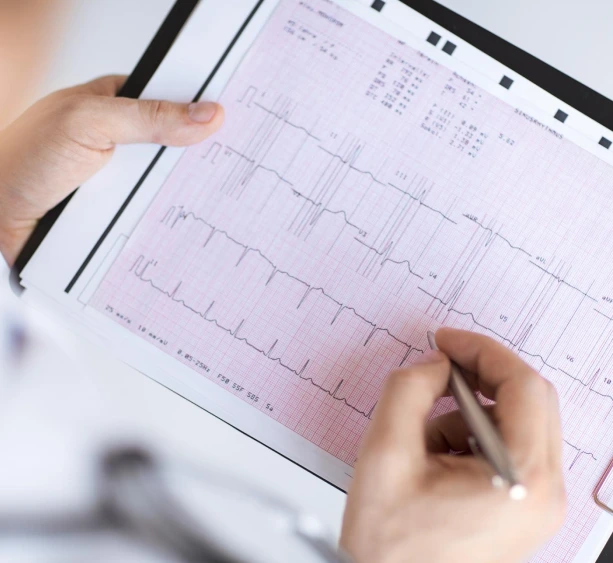


Examining your heart with accuracy and precision
At Artemis Cardiac Centre, we strive to ensure the best care for your heart with personalized care tailored to suit your individual needs. With advanced diagnostic modalities like Electrocardiogram, our experts analyse and assess the patients thoroughly, to plan the best possible care. Our team adheres to the use of the most advanced and innovative techniques because we are committed to treating you with excellence.
Our team strictly adheres to personalized treatment plans because we believe that every individual has unique medical requirements. Throughout your journey from treatment to recovery, we ensure your medical needs are being catered to with a robust approach.
ENQUIRE NOW.webp)

Electrocardiography, also known as ECG, is one of the most important diagnostic tools used in the field of cardiology. It helps doctors evaluate the general health of the heart and identify abnormalities, if any. This plays a crucial role in assessing the hearts overall health.
ECG is one of the most common procedures used to monitor heart health and instantly identify cardiac problems. The heart produces electrical impulses that stimulate the heart muscles to contract and pump blood. These electrical signals are captured by an ECG, which plots them as lines or waves on a graph to reveal details about the heart's rhythm and operation.
Electrocardiogram is widely used for monitoring and assessing heart health, especially in patients with existing heart diseases, such as heart failure, coronary artery disease, or valvular heart disease. ECG is also used for screening, particularly in high-risk patients, to find any underlying cardiac abnormalities before symptoms manifest.
An electrocardiogram may also be used for assessing/diagnosing
Electrocardiogram is broadly classified and based on the technique that is used:
ENQUIRE NOWIt is used for the detection and assessment of a condition involving the cardiopulmonary system
It is used for evaluation of heart function when you are under increased stress caused by physical exertion
It is a type of Electrocardiogram that allows doctors to continuously monitor heart function for a span of 24 hours or more.
It is a standard procedure in which doctors stick electrode pads on your chest and assess electrical activity of the heart while you are lying still.
The procedure is used for detecting intermittent abnormal heart rhythms.
We have restored hundreds of patients' lives with timely angioplasty at Artemis Cardiac Care . Whether it's an emergency heart attack or a planned procedure, our cardiology team has achieved consistent, high-success rates.
Our individualized care, state-of-the-art facilities, and post-procedure care are valued by our patients. We're honored to be go-to heart care partner, providing both clinical expertise and humane healing.




Distinguished Cardiac Care Expertise
Eminent Cardiac Care Integrated with Advanced Technology
Transformed Lives with Trust and Care .
You may be recommended to go for angioplasty if you are experiencing any of the following symptoms linked to coronary artery disease, which are not responding to medication and lifestyle modifications:

If you are have unusual chest pain

If you are lightheaded or dizzy.

Pounding sensation in the chest.

If your pulse is faster than normal

If you have breathing difficulty

If you get tired too easily

If you are feel anxious too often.

If you sweat a lot, even at night
Various Benefit of Electrocardiogram are:
An Electrocardiogram should be done at least once a year if you are middle-aged or elderly or have risk factors that make you more susceptible to a heart attack, such as high blood pressure, high cholesterol and diabetes.
An Electrocardiogram is a simple procedure that does not take more than a couple of minutes.
Yes, Electrocardiogram is a very safe procedure and there are no noteworthy risks associated with it. The only discomfort you feel is that experienced when the sticky electrode patches are removed from the chest.
An Electrocardiogram can help to assess a patient's heart rate, heart rhythm, amount of blood flowing to the heart muscle, damaged section of the heart and structural abnormalities in the heart.
Yes, anyone can go for an Electrocardiogram as it is a safe procedure.
From Recent Advancements in Heart Care to Tips and Tricks to make your Heart Healthy Again, stay updated with reliable and informative blogs by our experts.
View All Blogs

